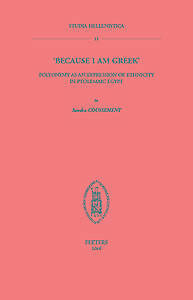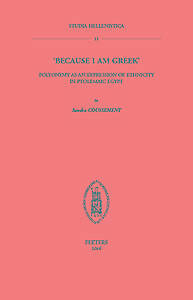
- Afhalen na 1 uur in een winkel met voorraad
- Gratis thuislevering in België vanaf € 30
- Ruim aanbod met 7 miljoen producten
- Afhalen na 1 uur in een winkel met voorraad
- Gratis thuislevering in België vanaf € 30
- Ruim aanbod met 7 miljoen producten
Zoeken
€ 98,00
+ 196 punten
Omschrijving
Double names have a long history in Egypt. They are already attested on Old Kingdom funerary monuments, where concern about eternal life required a correct identification of the deceased. When Greek and Egyptian cultures came into contact under the Ptolemies, bilingual polyonymy (i.e. the combination of an Egyptian and a Greek name) became more popular. During this period, Greek ethnicity was valued as a symbol of power and social status, and was used to create borders between the rulers and the ruled. At the same time, however, it was a flexible concept and this made it a useful tool for crossing the very same boundaries it constructed. As ethnicity became a crucial aspect of one's identity, it is not surprising that bilingual polyonymy was well attested among those that formed a bridge between the ruling class and the Egyptian population: particularly military, administrative and priestly officials. Since they moved between largely separated ethnic contexts, combining names of different linguistic origins was a way to negotiate their ethnic identities. Rather than serving as a reliable source for ethnic origin, names can therefore be interpreted as an expression of the ethnic identity of an individual in a certain space or context.
Specificaties
Betrokkenen
- Auteur(s):
- Uitgeverij:
Inhoud
- Aantal bladzijden:
- 449
- Taal:
- Engels
- Reeks:
- Reeksnummer:
- nr. 55
Eigenschappen
- Productcode (EAN):
- 9789042932722
- Verschijningsdatum:
- 29/02/2016
- Uitvoering:
- Paperback
- Formaat:
- Trade paperback (VS)
- Afmetingen:
- 155 mm x 239 mm
- Gewicht:
- 662 g

Alleen bij Standaard Boekhandel
+ 196 punten op je klantenkaart van Standaard Boekhandel
Beoordelingen
We publiceren alleen reviews die voldoen aan de voorwaarden voor reviews. Bekijk onze voorwaarden voor reviews.











